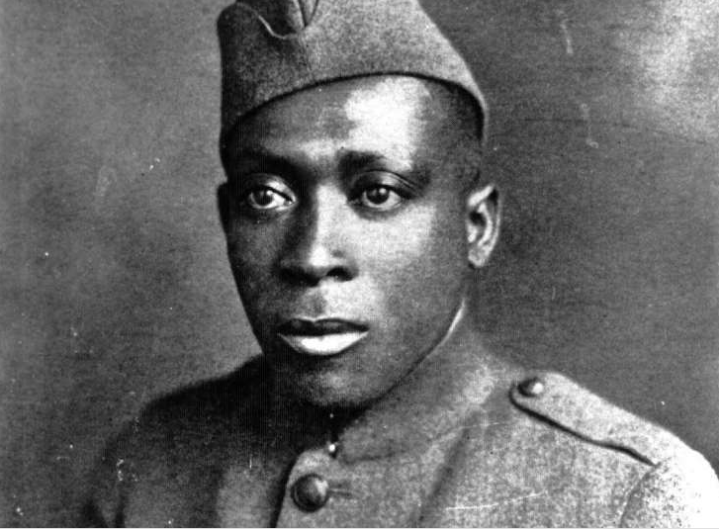create a shop and sell their amazing products to the world! If you have a product, you should definitely join this platform! We Buy Black also has it’s Inaugural We Buy Black Convention happening this November 16th-17th in Atlanta, GA and I hope to see you all there. In fact, I along with hundreds of others will be wearing our official We Buy Black T-shirt, so here’s my gift to you: Get 50% off the official WBB T-shirt using my code WBB2018. Peace, family!

North Carolina
William Henry Johnson was born ca. July 15, 1892, in Winston-Salem, North Carolina. During his teen years, he traveled to Albany, New York. There, he started a life for himself, working as a redcap porter for the Albany Union Station on Broadway. He held his porter position until the draft for World War I (WWI) was announced.
15 Infantry
Johnson enlisted in the U.S. Military on June 5, 1917. He joined the all-Black New York National Guard 15th Infantry Regiment. The 15th Infantry Regiment was later redesignated as the 369th Infantry Regiment and was based in Harlem. The 369th Infantry traveled to France where they joined the 185th Infantry Brigade. Johnson would join them six months later.
Racism
Once the Black regiments arrived in France, they were given labor duties instead of combat training. When they were asked to fight, many White U.S. soldiers vocalized their unwillingness to fight alongside Black soldiers. The U.S. Military decided to “loan” the 369th Infantry to the French Army.
The U.S. Military then published the pamphlet, Secret Information Concerning Black American Troops. The pamphlets were circulated to French soldiers and citizens, warning them that Black soldiers are “inferior” and have the tendencies to commit sexual assault. The French welcomed the Black soldiers and did not experience any of the issues they were warned about.
French Army
After several failed attempts due to misfortunes and bad weather, Johnson and the 369th Infantry arrived in France. His regiment was assigned to Outpost 20, which sat on the edge of Argonne Forest. The 369th Infantry was equipped with French gear in order to battle the Germans properly.

“Black Death”
While keeping watch on the night of May 14, 1918, Johnson came under attack. A German raiding party comprised of roughly 24 soldiers closed in. Johnson countered by fighting the Germans with grenades, the butt of his rifle, his bolo knife, and his fists. He protected his fellow soldiers but garnered 21 wounds overall. His valor, however, earned him the nickname, “Black Death” as a testament to his display of gallantry and superiority in combat.
Return
Upon their return, the 369th Infantry participated in a victory parade on Fifth Avenue in New York. Johnson was then paid to give a series of lectures. During his lectures, he spoke of the abuse that Black U.S. soldiers endured from White U.S. soldiers. He was then arrested for wearing his uniform beyond the prescribed date and he was no longer commissioned to lecture.
Legacy
In his later years, Johnson contracted tuberculosis. As a result, he was granted permanent and total disability in 1927. William Henry Johnson later died on July 1, 1929, in Washington, D.C. of myocarditis. He was around 37 years old.
Since his death, many institutions have been named in his honor, he has received numerous awards, and a monument was built in Albany, New York to commemorate him. On June 2, 2015, President Barack Obama honored Sergeant Johnson once more by posthumously granting him the Medal of Honor.

**The views and actions of the DDH historical figures that are featured may not reflect the views and beliefs of Ramiro The Writer (Nikodemus Mwandishi). Thank you.**








